Developing Workplace Critical Thinking: Management Theories Applied
VerifiedAdded on 2023/06/18
|16
|5614
|357
Report
AI Summary
This report delves into the crucial aspect of developing and enhancing critical thinking within the workplace, particularly in the context of organizational changes and challenges arising from the COVID-19 pandemic. It examines how shifts in beliefs, attitudes, and values impact employee behavior and organizational culture, referencing Unilever as a case study. The report applies key management theories, including System Management Theory, Bureaucratic Management Theory, Contingency Management Theory, and Theory X and Y, to assess employee attitudes and values. Furthermore, it explores motivation theories such as Herzberg's Two-Factor Theory and McClelland's Theory of Needs to understand and address employee motivation. The analysis culminates in recommendations for navigating post-COVID-19 challenges, focusing on maintaining a positive work environment and fostering critical thinking to achieve organizational objectives. The report emphasizes the importance of adapting leadership styles and motivational strategies to support employees during periods of significant change.
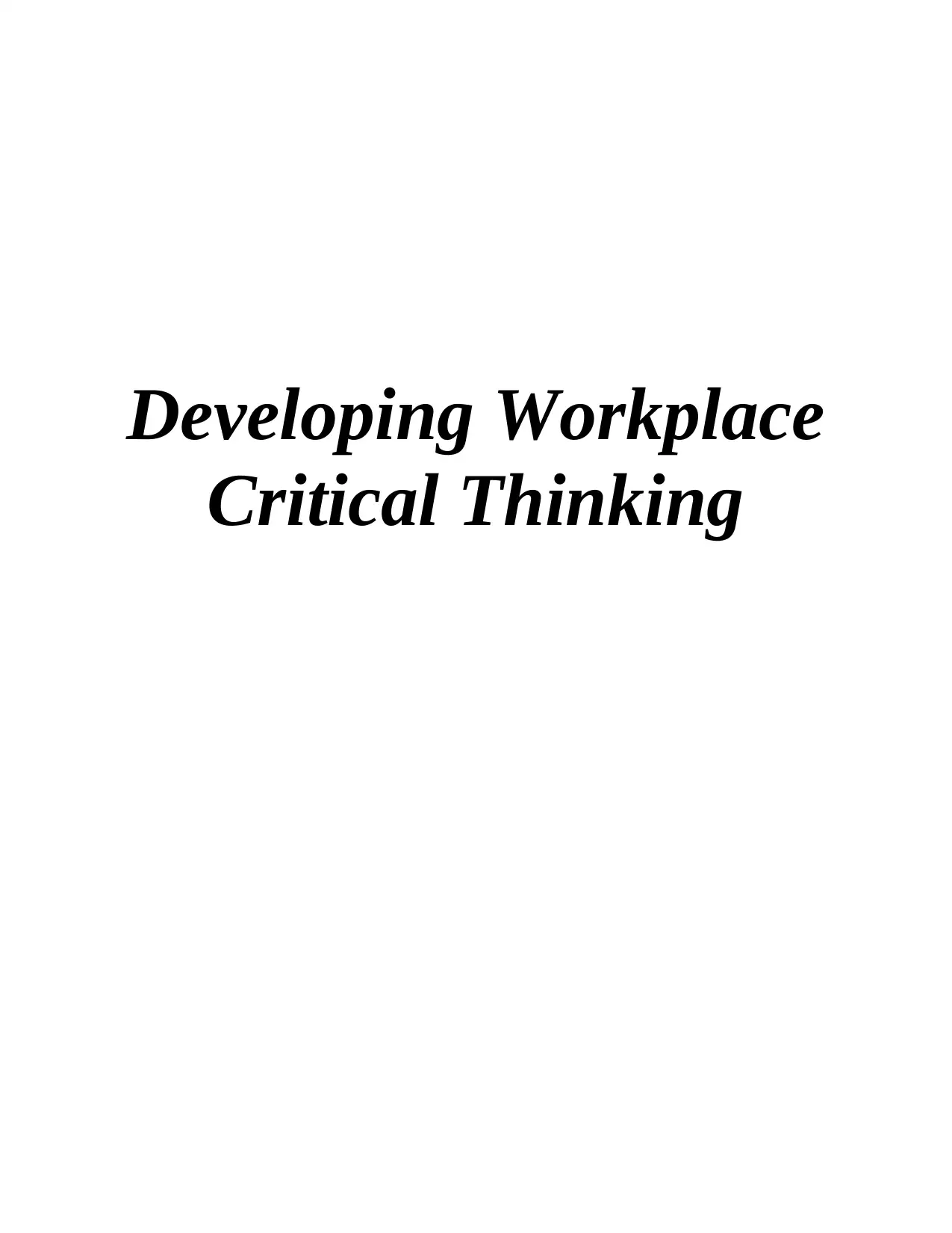
Developing Workplace
Critical Thinking
Critical Thinking
Paraphrase This Document
Need a fresh take? Get an instant paraphrase of this document with our AI Paraphraser
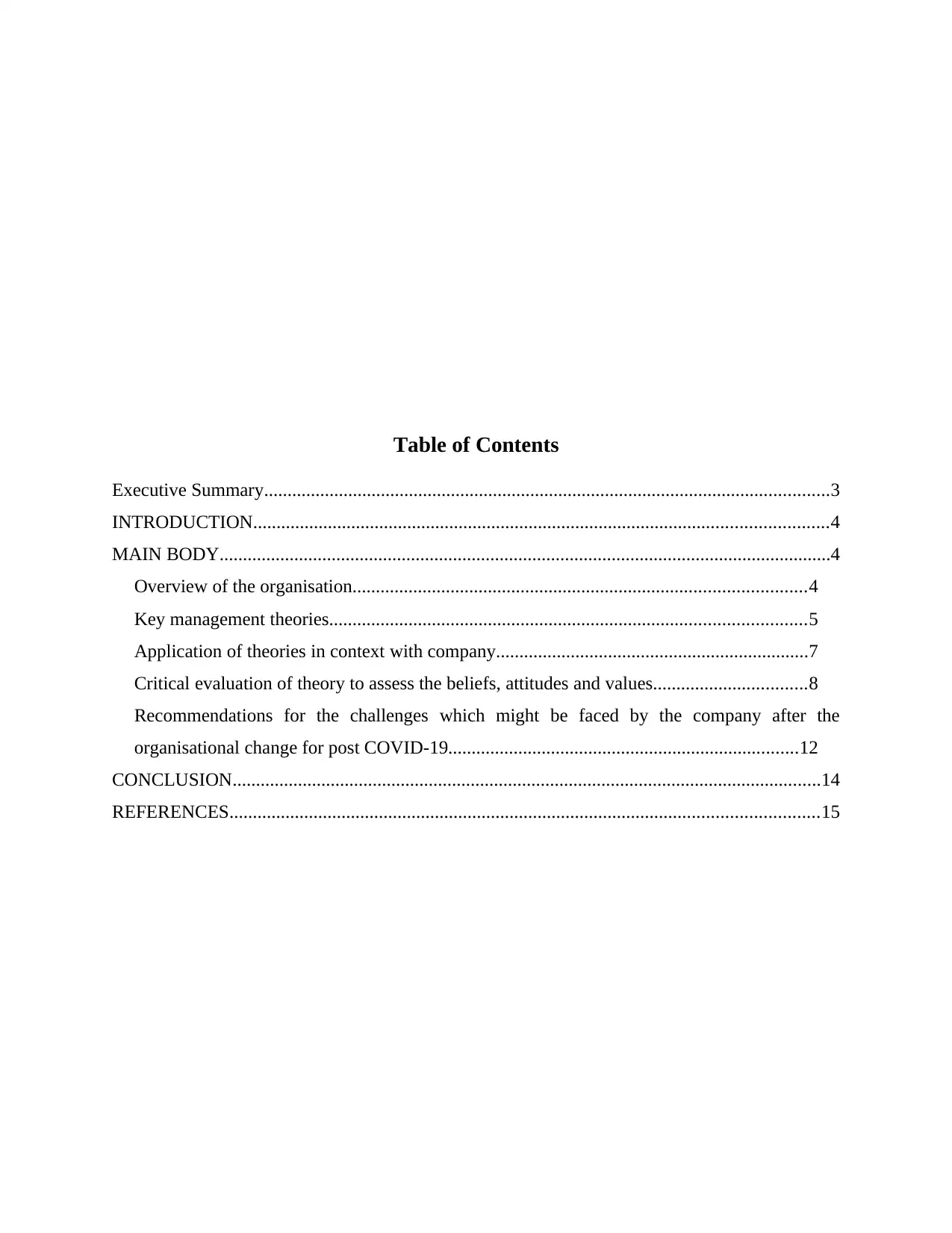
Table of Contents
Executive Summary.........................................................................................................................3
INTRODUCTION...........................................................................................................................4
MAIN BODY...................................................................................................................................4
Overview of the organisation.................................................................................................4
Key management theories......................................................................................................5
Application of theories in context with company...................................................................7
Critical evaluation of theory to assess the beliefs, attitudes and values.................................8
Recommendations for the challenges which might be faced by the company after the
organisational change for post COVID-19...........................................................................12
CONCLUSION..............................................................................................................................14
REFERENCES..............................................................................................................................15
Executive Summary.........................................................................................................................3
INTRODUCTION...........................................................................................................................4
MAIN BODY...................................................................................................................................4
Overview of the organisation.................................................................................................4
Key management theories......................................................................................................5
Application of theories in context with company...................................................................7
Critical evaluation of theory to assess the beliefs, attitudes and values.................................8
Recommendations for the challenges which might be faced by the company after the
organisational change for post COVID-19...........................................................................12
CONCLUSION..............................................................................................................................14
REFERENCES..............................................................................................................................15
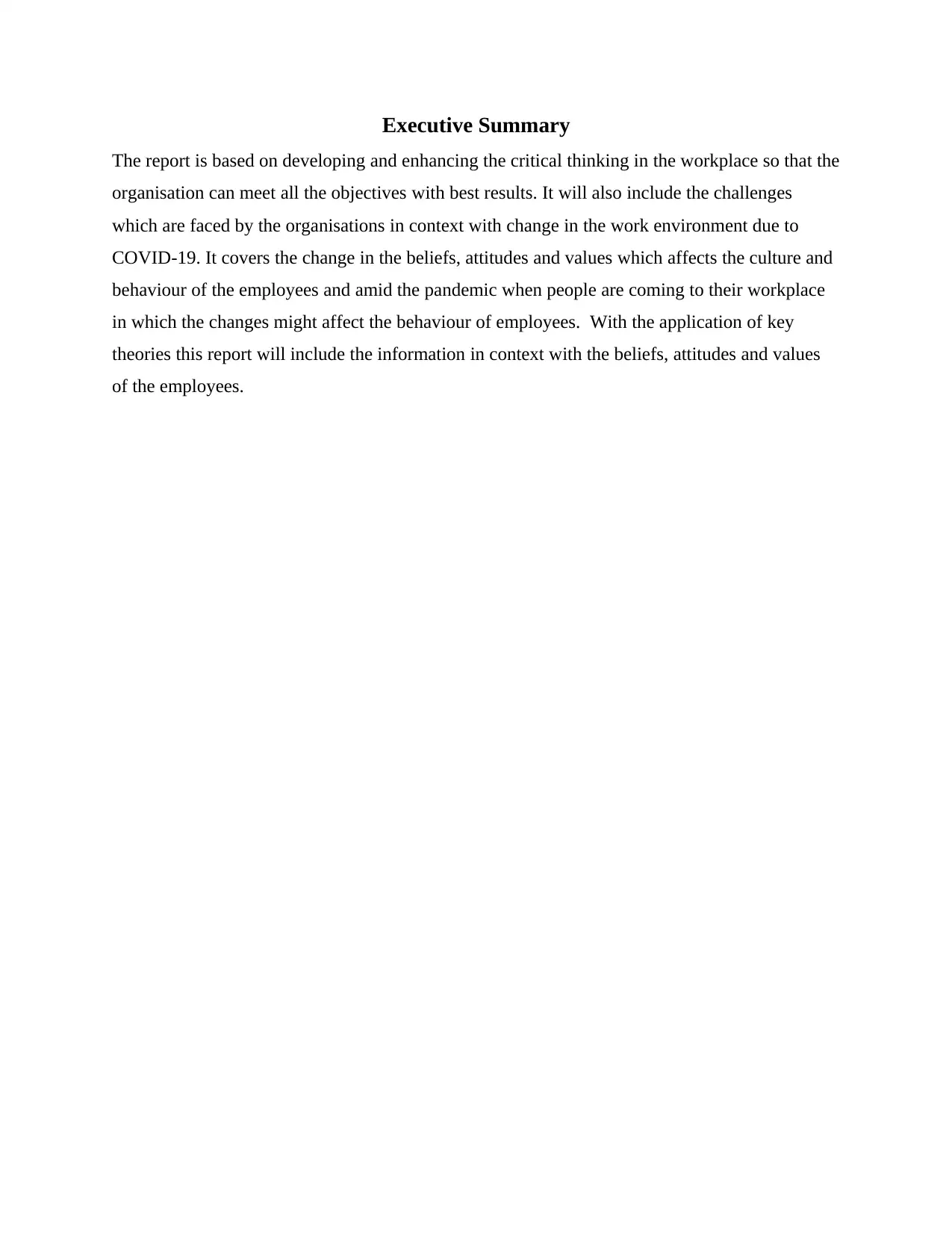
Executive Summary
The report is based on developing and enhancing the critical thinking in the workplace so that the
organisation can meet all the objectives with best results. It will also include the challenges
which are faced by the organisations in context with change in the work environment due to
COVID-19. It covers the change in the beliefs, attitudes and values which affects the culture and
behaviour of the employees and amid the pandemic when people are coming to their workplace
in which the changes might affect the behaviour of employees. With the application of key
theories this report will include the information in context with the beliefs, attitudes and values
of the employees.
The report is based on developing and enhancing the critical thinking in the workplace so that the
organisation can meet all the objectives with best results. It will also include the challenges
which are faced by the organisations in context with change in the work environment due to
COVID-19. It covers the change in the beliefs, attitudes and values which affects the culture and
behaviour of the employees and amid the pandemic when people are coming to their workplace
in which the changes might affect the behaviour of employees. With the application of key
theories this report will include the information in context with the beliefs, attitudes and values
of the employees.
⊘ This is a preview!⊘
Do you want full access?
Subscribe today to unlock all pages.

Trusted by 1+ million students worldwide
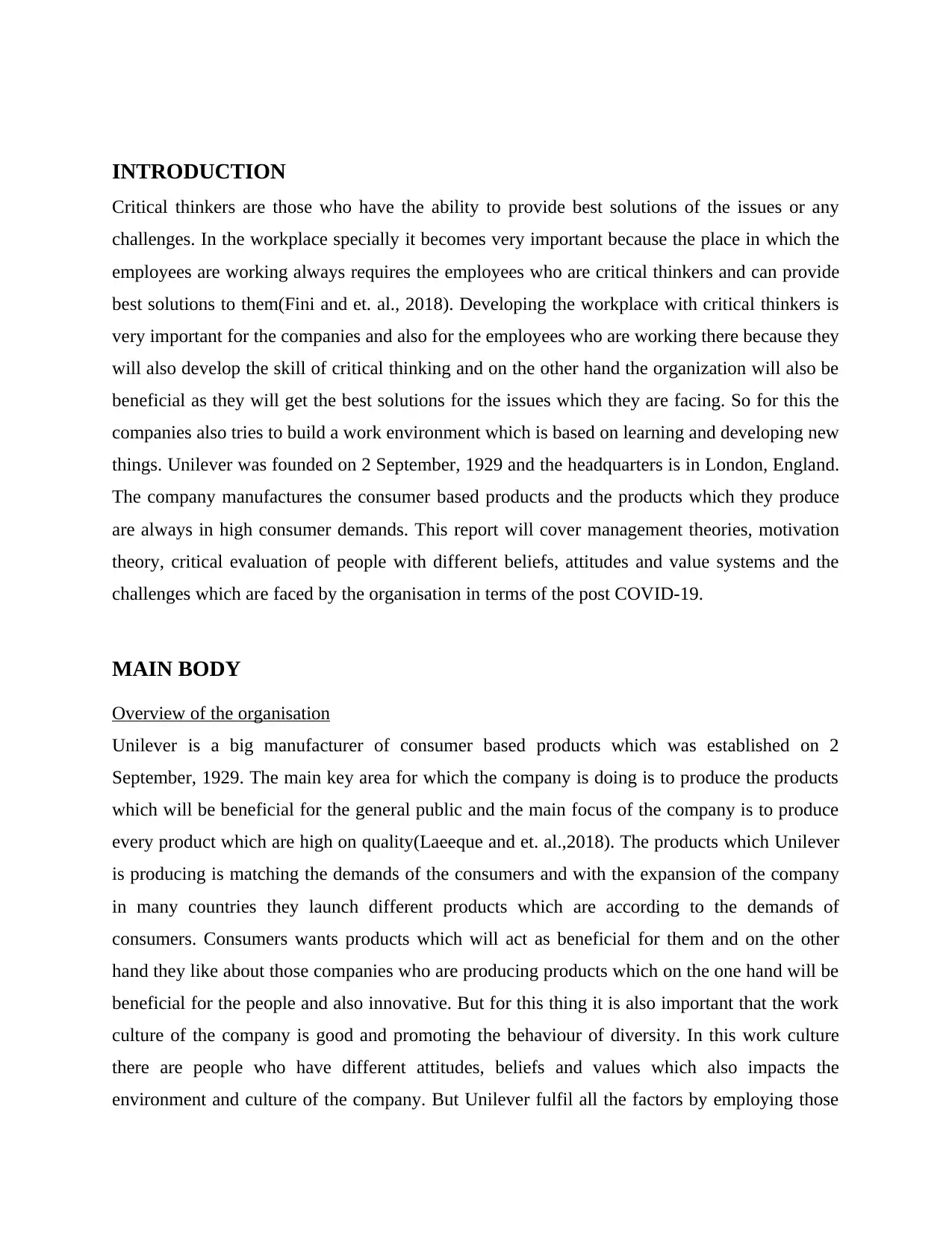
INTRODUCTION
Critical thinkers are those who have the ability to provide best solutions of the issues or any
challenges. In the workplace specially it becomes very important because the place in which the
employees are working always requires the employees who are critical thinkers and can provide
best solutions to them(Fini and et. al., 2018). Developing the workplace with critical thinkers is
very important for the companies and also for the employees who are working there because they
will also develop the skill of critical thinking and on the other hand the organization will also be
beneficial as they will get the best solutions for the issues which they are facing. So for this the
companies also tries to build a work environment which is based on learning and developing new
things. Unilever was founded on 2 September, 1929 and the headquarters is in London, England.
The company manufactures the consumer based products and the products which they produce
are always in high consumer demands. This report will cover management theories, motivation
theory, critical evaluation of people with different beliefs, attitudes and value systems and the
challenges which are faced by the organisation in terms of the post COVID-19.
MAIN BODY
Overview of the organisation
Unilever is a big manufacturer of consumer based products which was established on 2
September, 1929. The main key area for which the company is doing is to produce the products
which will be beneficial for the general public and the main focus of the company is to produce
every product which are high on quality(Laeeque and et. al.,2018). The products which Unilever
is producing is matching the demands of the consumers and with the expansion of the company
in many countries they launch different products which are according to the demands of
consumers. Consumers wants products which will act as beneficial for them and on the other
hand they like about those companies who are producing products which on the one hand will be
beneficial for the people and also innovative. But for this thing it is also important that the work
culture of the company is good and promoting the behaviour of diversity. In this work culture
there are people who have different attitudes, beliefs and values which also impacts the
environment and culture of the company. But Unilever fulfil all the factors by employing those
Critical thinkers are those who have the ability to provide best solutions of the issues or any
challenges. In the workplace specially it becomes very important because the place in which the
employees are working always requires the employees who are critical thinkers and can provide
best solutions to them(Fini and et. al., 2018). Developing the workplace with critical thinkers is
very important for the companies and also for the employees who are working there because they
will also develop the skill of critical thinking and on the other hand the organization will also be
beneficial as they will get the best solutions for the issues which they are facing. So for this the
companies also tries to build a work environment which is based on learning and developing new
things. Unilever was founded on 2 September, 1929 and the headquarters is in London, England.
The company manufactures the consumer based products and the products which they produce
are always in high consumer demands. This report will cover management theories, motivation
theory, critical evaluation of people with different beliefs, attitudes and value systems and the
challenges which are faced by the organisation in terms of the post COVID-19.
MAIN BODY
Overview of the organisation
Unilever is a big manufacturer of consumer based products which was established on 2
September, 1929. The main key area for which the company is doing is to produce the products
which will be beneficial for the general public and the main focus of the company is to produce
every product which are high on quality(Laeeque and et. al.,2018). The products which Unilever
is producing is matching the demands of the consumers and with the expansion of the company
in many countries they launch different products which are according to the demands of
consumers. Consumers wants products which will act as beneficial for them and on the other
hand they like about those companies who are producing products which on the one hand will be
beneficial for the people and also innovative. But for this thing it is also important that the work
culture of the company is good and promoting the behaviour of diversity. In this work culture
there are people who have different attitudes, beliefs and values which also impacts the
environment and culture of the company. But Unilever fulfil all the factors by employing those
Paraphrase This Document
Need a fresh take? Get an instant paraphrase of this document with our AI Paraphraser
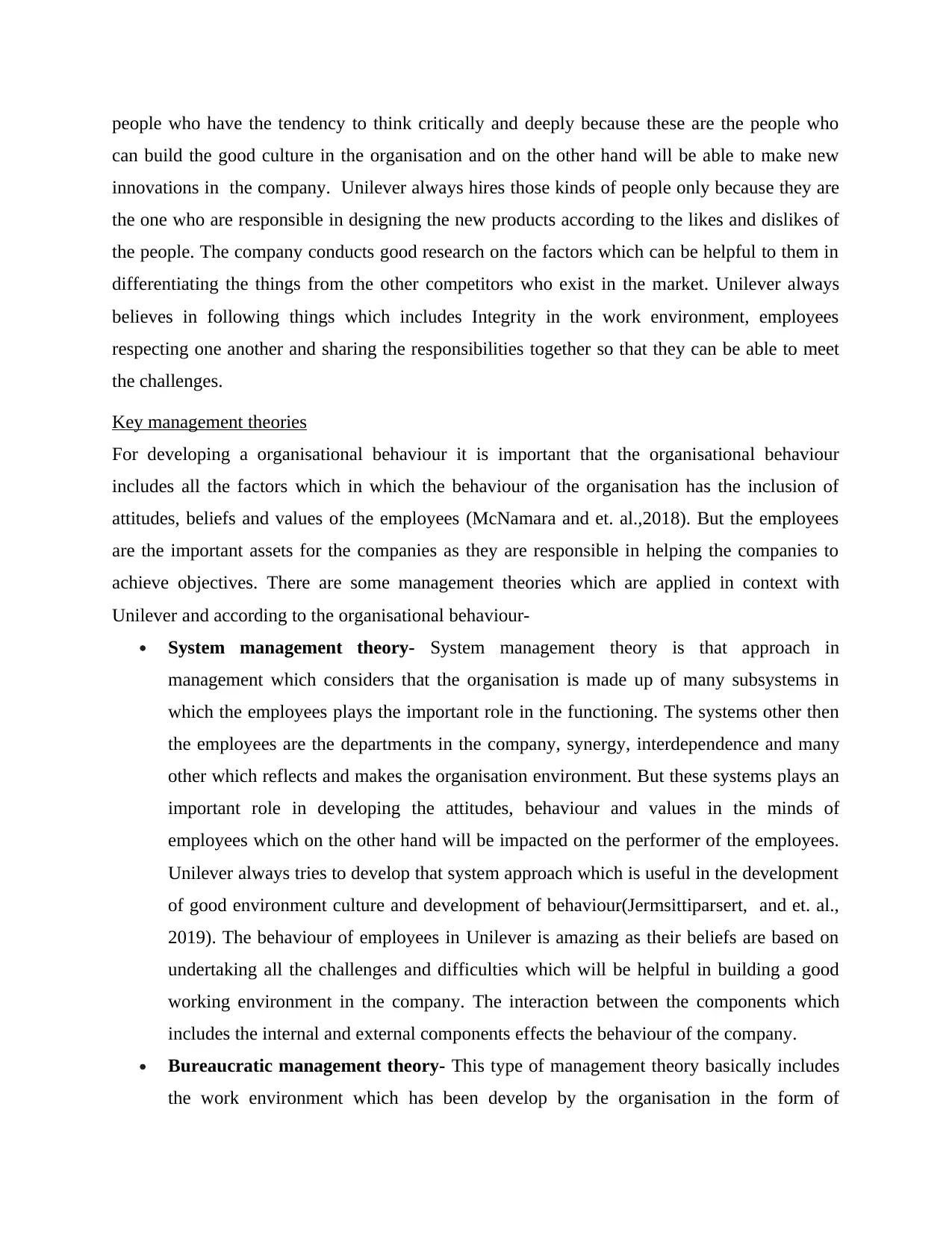
people who have the tendency to think critically and deeply because these are the people who
can build the good culture in the organisation and on the other hand will be able to make new
innovations in the company. Unilever always hires those kinds of people only because they are
the one who are responsible in designing the new products according to the likes and dislikes of
the people. The company conducts good research on the factors which can be helpful to them in
differentiating the things from the other competitors who exist in the market. Unilever always
believes in following things which includes Integrity in the work environment, employees
respecting one another and sharing the responsibilities together so that they can be able to meet
the challenges.
Key management theories
For developing a organisational behaviour it is important that the organisational behaviour
includes all the factors which in which the behaviour of the organisation has the inclusion of
attitudes, beliefs and values of the employees (McNamara and et. al.,2018). But the employees
are the important assets for the companies as they are responsible in helping the companies to
achieve objectives. There are some management theories which are applied in context with
Unilever and according to the organisational behaviour-
System management theory- System management theory is that approach in
management which considers that the organisation is made up of many subsystems in
which the employees plays the important role in the functioning. The systems other then
the employees are the departments in the company, synergy, interdependence and many
other which reflects and makes the organisation environment. But these systems plays an
important role in developing the attitudes, behaviour and values in the minds of
employees which on the other hand will be impacted on the performer of the employees.
Unilever always tries to develop that system approach which is useful in the development
of good environment culture and development of behaviour(Jermsittiparsert, and et. al.,
2019). The behaviour of employees in Unilever is amazing as their beliefs are based on
undertaking all the challenges and difficulties which will be helpful in building a good
working environment in the company. The interaction between the components which
includes the internal and external components effects the behaviour of the company.
Bureaucratic management theory- This type of management theory basically includes
the work environment which has been develop by the organisation in the form of
can build the good culture in the organisation and on the other hand will be able to make new
innovations in the company. Unilever always hires those kinds of people only because they are
the one who are responsible in designing the new products according to the likes and dislikes of
the people. The company conducts good research on the factors which can be helpful to them in
differentiating the things from the other competitors who exist in the market. Unilever always
believes in following things which includes Integrity in the work environment, employees
respecting one another and sharing the responsibilities together so that they can be able to meet
the challenges.
Key management theories
For developing a organisational behaviour it is important that the organisational behaviour
includes all the factors which in which the behaviour of the organisation has the inclusion of
attitudes, beliefs and values of the employees (McNamara and et. al.,2018). But the employees
are the important assets for the companies as they are responsible in helping the companies to
achieve objectives. There are some management theories which are applied in context with
Unilever and according to the organisational behaviour-
System management theory- System management theory is that approach in
management which considers that the organisation is made up of many subsystems in
which the employees plays the important role in the functioning. The systems other then
the employees are the departments in the company, synergy, interdependence and many
other which reflects and makes the organisation environment. But these systems plays an
important role in developing the attitudes, behaviour and values in the minds of
employees which on the other hand will be impacted on the performer of the employees.
Unilever always tries to develop that system approach which is useful in the development
of good environment culture and development of behaviour(Jermsittiparsert, and et. al.,
2019). The behaviour of employees in Unilever is amazing as their beliefs are based on
undertaking all the challenges and difficulties which will be helpful in building a good
working environment in the company. The interaction between the components which
includes the internal and external components effects the behaviour of the company.
Bureaucratic management theory- This type of management theory basically includes
the work environment which has been develop by the organisation in the form of
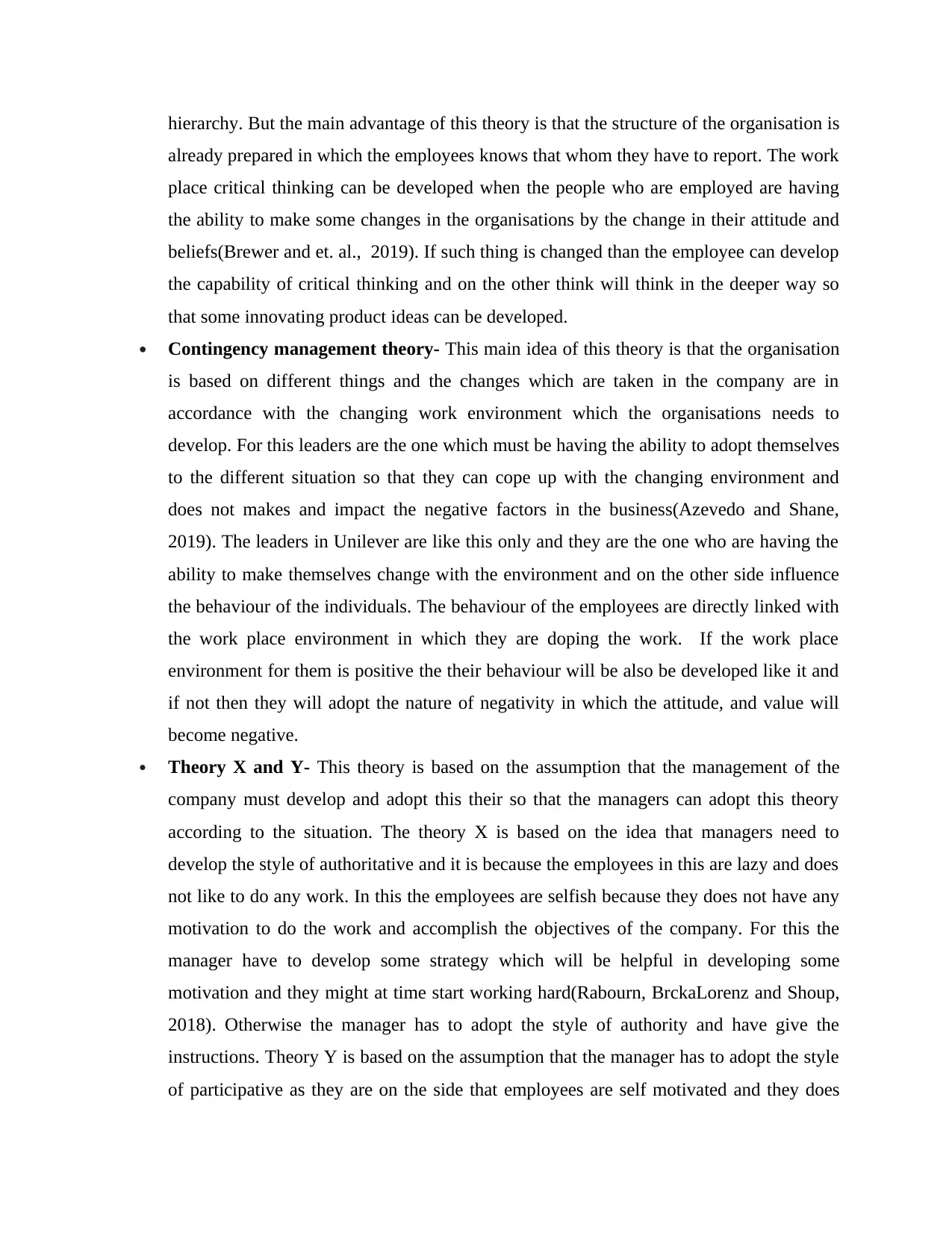
hierarchy. But the main advantage of this theory is that the structure of the organisation is
already prepared in which the employees knows that whom they have to report. The work
place critical thinking can be developed when the people who are employed are having
the ability to make some changes in the organisations by the change in their attitude and
beliefs(Brewer and et. al., 2019). If such thing is changed than the employee can develop
the capability of critical thinking and on the other think will think in the deeper way so
that some innovating product ideas can be developed.
Contingency management theory- This main idea of this theory is that the organisation
is based on different things and the changes which are taken in the company are in
accordance with the changing work environment which the organisations needs to
develop. For this leaders are the one which must be having the ability to adopt themselves
to the different situation so that they can cope up with the changing environment and
does not makes and impact the negative factors in the business(Azevedo and Shane,
2019). The leaders in Unilever are like this only and they are the one who are having the
ability to make themselves change with the environment and on the other side influence
the behaviour of the individuals. The behaviour of the employees are directly linked with
the work place environment in which they are doping the work. If the work place
environment for them is positive the their behaviour will be also be developed like it and
if not then they will adopt the nature of negativity in which the attitude, and value will
become negative.
Theory X and Y- This theory is based on the assumption that the management of the
company must develop and adopt this their so that the managers can adopt this theory
according to the situation. The theory X is based on the idea that managers need to
develop the style of authoritative and it is because the employees in this are lazy and does
not like to do any work. In this the employees are selfish because they does not have any
motivation to do the work and accomplish the objectives of the company. For this the
manager have to develop some strategy which will be helpful in developing some
motivation and they might at time start working hard(Rabourn, BrckaLorenz and Shoup,
2018). Otherwise the manager has to adopt the style of authority and have give the
instructions. Theory Y is based on the assumption that the manager has to adopt the style
of participative as they are on the side that employees are self motivated and they does
already prepared in which the employees knows that whom they have to report. The work
place critical thinking can be developed when the people who are employed are having
the ability to make some changes in the organisations by the change in their attitude and
beliefs(Brewer and et. al., 2019). If such thing is changed than the employee can develop
the capability of critical thinking and on the other think will think in the deeper way so
that some innovating product ideas can be developed.
Contingency management theory- This main idea of this theory is that the organisation
is based on different things and the changes which are taken in the company are in
accordance with the changing work environment which the organisations needs to
develop. For this leaders are the one which must be having the ability to adopt themselves
to the different situation so that they can cope up with the changing environment and
does not makes and impact the negative factors in the business(Azevedo and Shane,
2019). The leaders in Unilever are like this only and they are the one who are having the
ability to make themselves change with the environment and on the other side influence
the behaviour of the individuals. The behaviour of the employees are directly linked with
the work place environment in which they are doping the work. If the work place
environment for them is positive the their behaviour will be also be developed like it and
if not then they will adopt the nature of negativity in which the attitude, and value will
become negative.
Theory X and Y- This theory is based on the assumption that the management of the
company must develop and adopt this their so that the managers can adopt this theory
according to the situation. The theory X is based on the idea that managers need to
develop the style of authoritative and it is because the employees in this are lazy and does
not like to do any work. In this the employees are selfish because they does not have any
motivation to do the work and accomplish the objectives of the company. For this the
manager have to develop some strategy which will be helpful in developing some
motivation and they might at time start working hard(Rabourn, BrckaLorenz and Shoup,
2018). Otherwise the manager has to adopt the style of authority and have give the
instructions. Theory Y is based on the assumption that the manager has to adopt the style
of participative as they are on the side that employees are self motivated and they does
⊘ This is a preview!⊘
Do you want full access?
Subscribe today to unlock all pages.

Trusted by 1+ million students worldwide
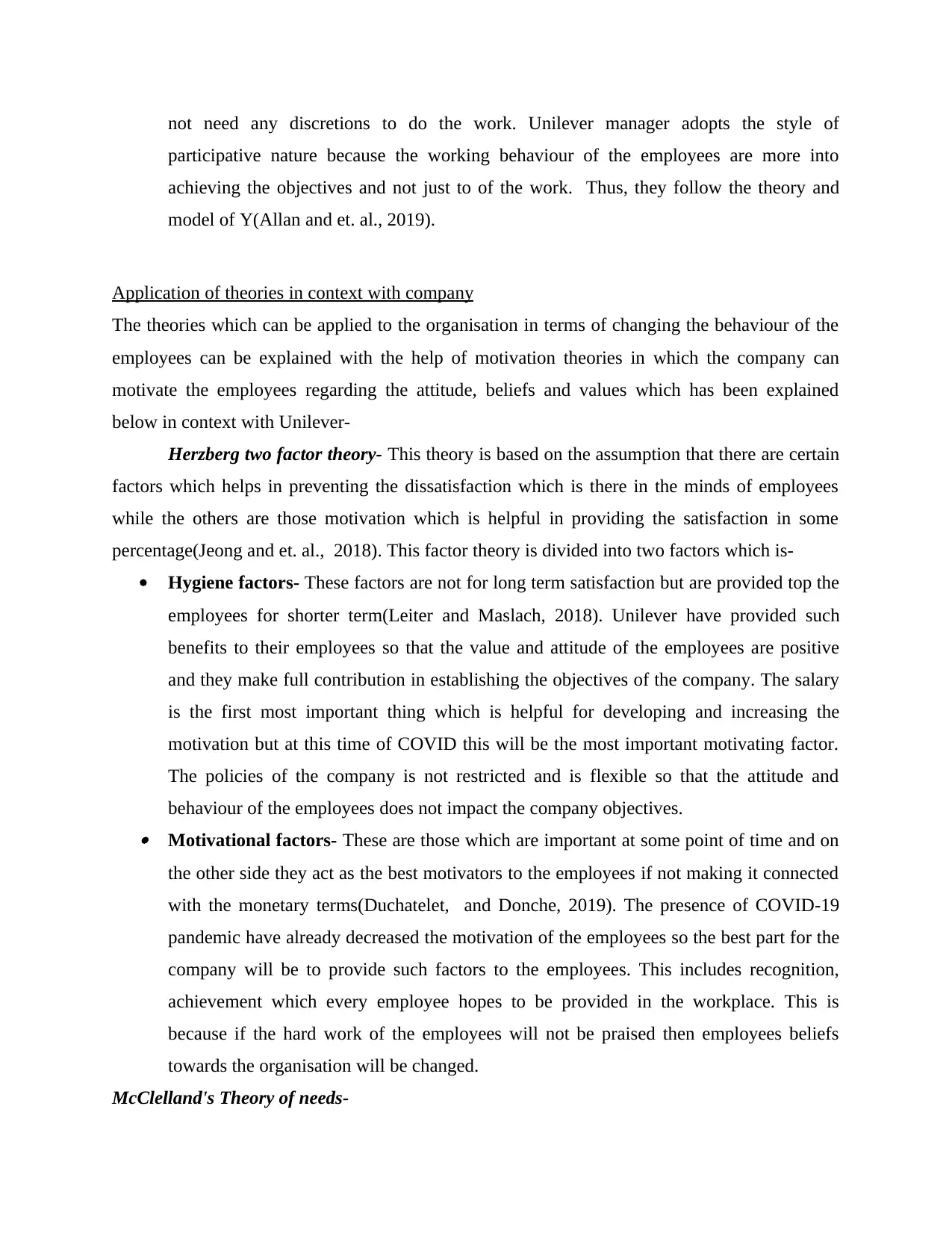
not need any discretions to do the work. Unilever manager adopts the style of
participative nature because the working behaviour of the employees are more into
achieving the objectives and not just to of the work. Thus, they follow the theory and
model of Y(Allan and et. al., 2019).
Application of theories in context with company
The theories which can be applied to the organisation in terms of changing the behaviour of the
employees can be explained with the help of motivation theories in which the company can
motivate the employees regarding the attitude, beliefs and values which has been explained
below in context with Unilever-
Herzberg two factor theory- This theory is based on the assumption that there are certain
factors which helps in preventing the dissatisfaction which is there in the minds of employees
while the others are those motivation which is helpful in providing the satisfaction in some
percentage(Jeong and et. al., 2018). This factor theory is divided into two factors which is-
Hygiene factors- These factors are not for long term satisfaction but are provided top the
employees for shorter term(Leiter and Maslach, 2018). Unilever have provided such
benefits to their employees so that the value and attitude of the employees are positive
and they make full contribution in establishing the objectives of the company. The salary
is the first most important thing which is helpful for developing and increasing the
motivation but at this time of COVID this will be the most important motivating factor.
The policies of the company is not restricted and is flexible so that the attitude and
behaviour of the employees does not impact the company objectives. Motivational factors- These are those which are important at some point of time and on
the other side they act as the best motivators to the employees if not making it connected
with the monetary terms(Duchatelet, and Donche, 2019). The presence of COVID-19
pandemic have already decreased the motivation of the employees so the best part for the
company will be to provide such factors to the employees. This includes recognition,
achievement which every employee hopes to be provided in the workplace. This is
because if the hard work of the employees will not be praised then employees beliefs
towards the organisation will be changed.
McClelland's Theory of needs-
participative nature because the working behaviour of the employees are more into
achieving the objectives and not just to of the work. Thus, they follow the theory and
model of Y(Allan and et. al., 2019).
Application of theories in context with company
The theories which can be applied to the organisation in terms of changing the behaviour of the
employees can be explained with the help of motivation theories in which the company can
motivate the employees regarding the attitude, beliefs and values which has been explained
below in context with Unilever-
Herzberg two factor theory- This theory is based on the assumption that there are certain
factors which helps in preventing the dissatisfaction which is there in the minds of employees
while the others are those motivation which is helpful in providing the satisfaction in some
percentage(Jeong and et. al., 2018). This factor theory is divided into two factors which is-
Hygiene factors- These factors are not for long term satisfaction but are provided top the
employees for shorter term(Leiter and Maslach, 2018). Unilever have provided such
benefits to their employees so that the value and attitude of the employees are positive
and they make full contribution in establishing the objectives of the company. The salary
is the first most important thing which is helpful for developing and increasing the
motivation but at this time of COVID this will be the most important motivating factor.
The policies of the company is not restricted and is flexible so that the attitude and
behaviour of the employees does not impact the company objectives. Motivational factors- These are those which are important at some point of time and on
the other side they act as the best motivators to the employees if not making it connected
with the monetary terms(Duchatelet, and Donche, 2019). The presence of COVID-19
pandemic have already decreased the motivation of the employees so the best part for the
company will be to provide such factors to the employees. This includes recognition,
achievement which every employee hopes to be provided in the workplace. This is
because if the hard work of the employees will not be praised then employees beliefs
towards the organisation will be changed.
McClelland's Theory of needs-
Paraphrase This Document
Need a fresh take? Get an instant paraphrase of this document with our AI Paraphraser
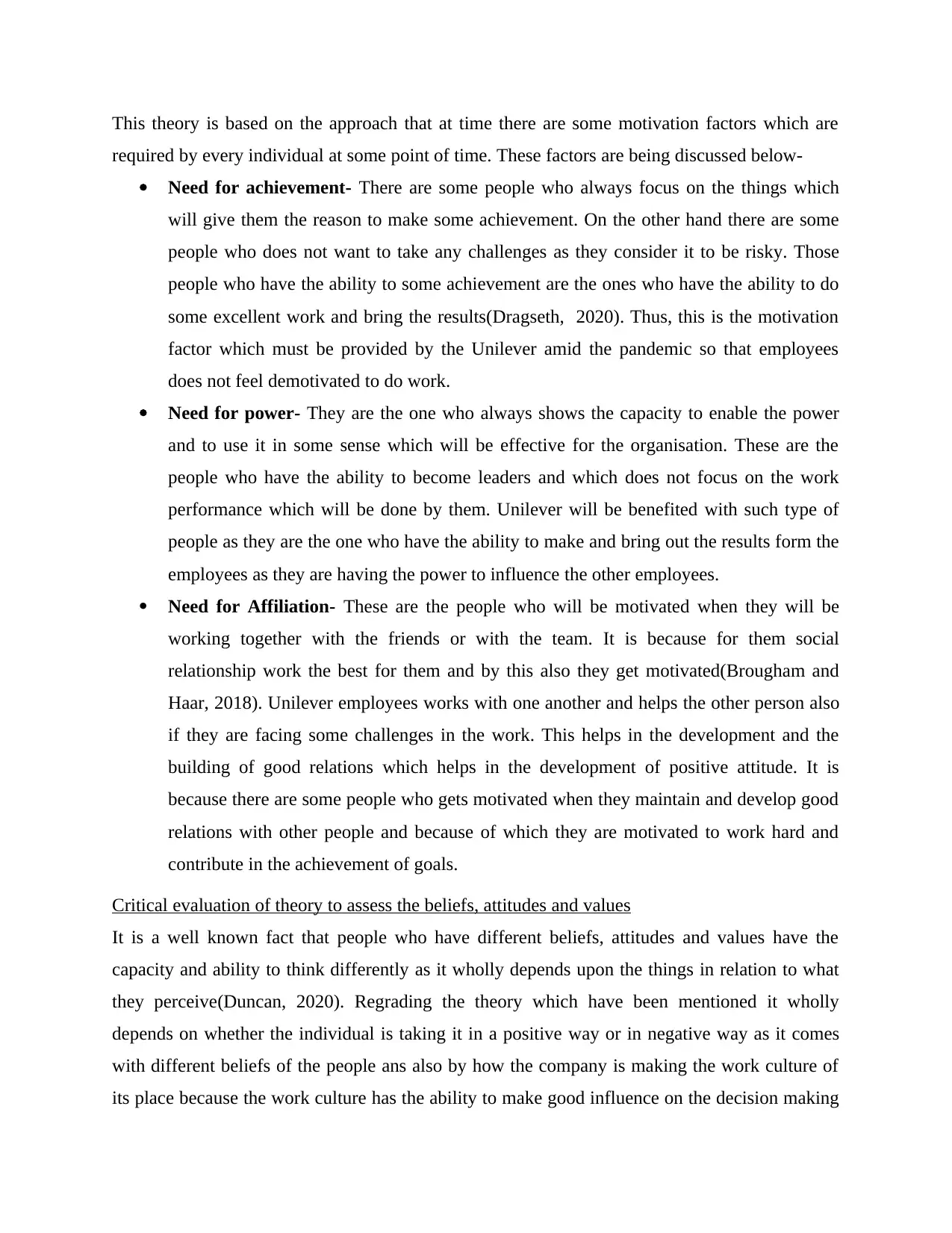
This theory is based on the approach that at time there are some motivation factors which are
required by every individual at some point of time. These factors are being discussed below-
Need for achievement- There are some people who always focus on the things which
will give them the reason to make some achievement. On the other hand there are some
people who does not want to take any challenges as they consider it to be risky. Those
people who have the ability to some achievement are the ones who have the ability to do
some excellent work and bring the results(Dragseth, 2020). Thus, this is the motivation
factor which must be provided by the Unilever amid the pandemic so that employees
does not feel demotivated to do work.
Need for power- They are the one who always shows the capacity to enable the power
and to use it in some sense which will be effective for the organisation. These are the
people who have the ability to become leaders and which does not focus on the work
performance which will be done by them. Unilever will be benefited with such type of
people as they are the one who have the ability to make and bring out the results form the
employees as they are having the power to influence the other employees.
Need for Affiliation- These are the people who will be motivated when they will be
working together with the friends or with the team. It is because for them social
relationship work the best for them and by this also they get motivated(Brougham and
Haar, 2018). Unilever employees works with one another and helps the other person also
if they are facing some challenges in the work. This helps in the development and the
building of good relations which helps in the development of positive attitude. It is
because there are some people who gets motivated when they maintain and develop good
relations with other people and because of which they are motivated to work hard and
contribute in the achievement of goals.
Critical evaluation of theory to assess the beliefs, attitudes and values
It is a well known fact that people who have different beliefs, attitudes and values have the
capacity and ability to think differently as it wholly depends upon the things in relation to what
they perceive(Duncan, 2020). Regrading the theory which have been mentioned it wholly
depends on whether the individual is taking it in a positive way or in negative way as it comes
with different beliefs of the people ans also by how the company is making the work culture of
its place because the work culture has the ability to make good influence on the decision making
required by every individual at some point of time. These factors are being discussed below-
Need for achievement- There are some people who always focus on the things which
will give them the reason to make some achievement. On the other hand there are some
people who does not want to take any challenges as they consider it to be risky. Those
people who have the ability to some achievement are the ones who have the ability to do
some excellent work and bring the results(Dragseth, 2020). Thus, this is the motivation
factor which must be provided by the Unilever amid the pandemic so that employees
does not feel demotivated to do work.
Need for power- They are the one who always shows the capacity to enable the power
and to use it in some sense which will be effective for the organisation. These are the
people who have the ability to become leaders and which does not focus on the work
performance which will be done by them. Unilever will be benefited with such type of
people as they are the one who have the ability to make and bring out the results form the
employees as they are having the power to influence the other employees.
Need for Affiliation- These are the people who will be motivated when they will be
working together with the friends or with the team. It is because for them social
relationship work the best for them and by this also they get motivated(Brougham and
Haar, 2018). Unilever employees works with one another and helps the other person also
if they are facing some challenges in the work. This helps in the development and the
building of good relations which helps in the development of positive attitude. It is
because there are some people who gets motivated when they maintain and develop good
relations with other people and because of which they are motivated to work hard and
contribute in the achievement of goals.
Critical evaluation of theory to assess the beliefs, attitudes and values
It is a well known fact that people who have different beliefs, attitudes and values have the
capacity and ability to think differently as it wholly depends upon the things in relation to what
they perceive(Duncan, 2020). Regrading the theory which have been mentioned it wholly
depends on whether the individual is taking it in a positive way or in negative way as it comes
with different beliefs of the people ans also by how the company is making the work culture of
its place because the work culture has the ability to make good influence on the decision making
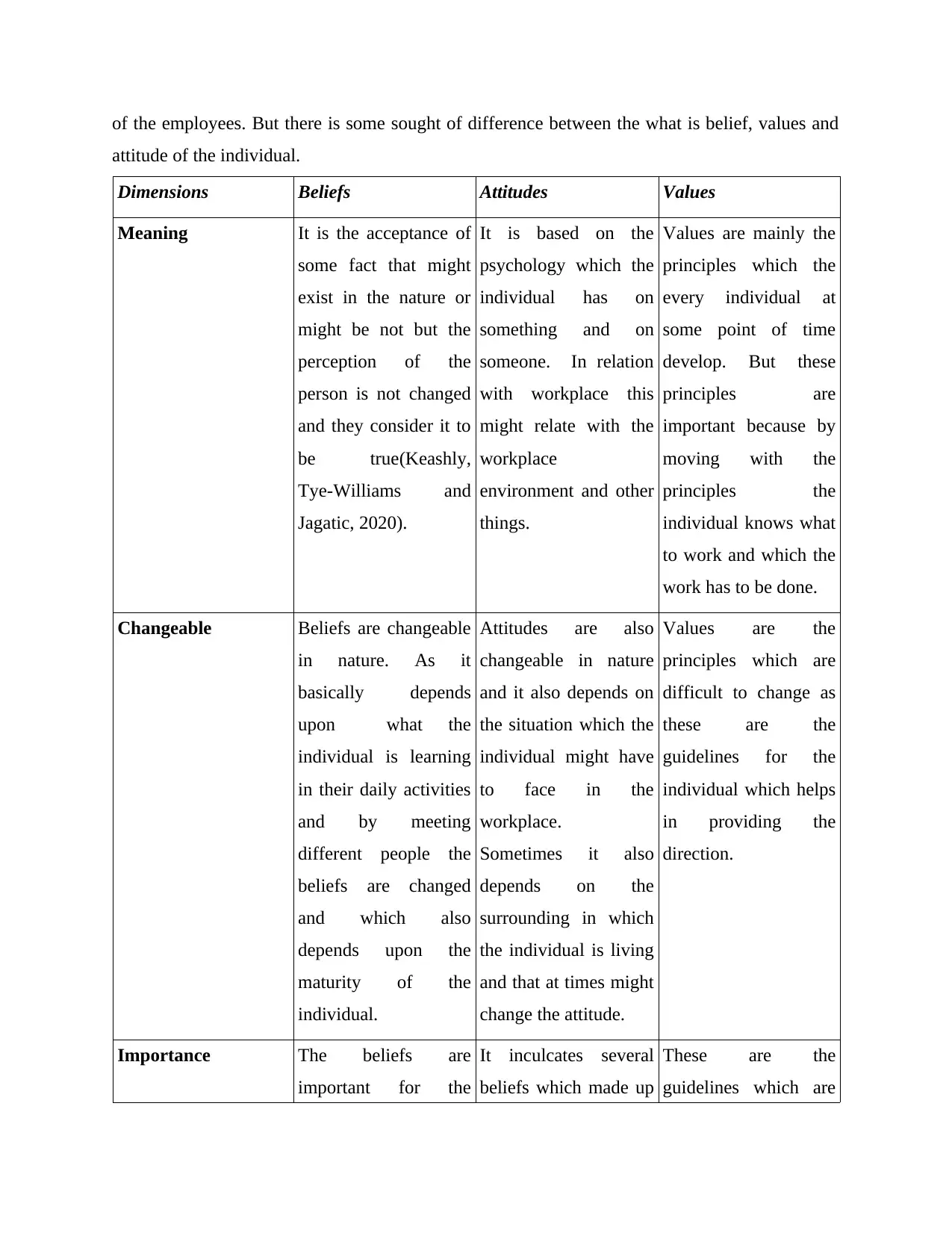
of the employees. But there is some sought of difference between the what is belief, values and
attitude of the individual.
Dimensions Beliefs Attitudes Values
Meaning It is the acceptance of
some fact that might
exist in the nature or
might be not but the
perception of the
person is not changed
and they consider it to
be true(Keashly,
Tye-Williams and
Jagatic, 2020).
It is based on the
psychology which the
individual has on
something and on
someone. In relation
with workplace this
might relate with the
workplace
environment and other
things.
Values are mainly the
principles which the
every individual at
some point of time
develop. But these
principles are
important because by
moving with the
principles the
individual knows what
to work and which the
work has to be done.
Changeable Beliefs are changeable
in nature. As it
basically depends
upon what the
individual is learning
in their daily activities
and by meeting
different people the
beliefs are changed
and which also
depends upon the
maturity of the
individual.
Attitudes are also
changeable in nature
and it also depends on
the situation which the
individual might have
to face in the
workplace.
Sometimes it also
depends on the
surrounding in which
the individual is living
and that at times might
change the attitude.
Values are the
principles which are
difficult to change as
these are the
guidelines for the
individual which helps
in providing the
direction.
Importance The beliefs are
important for the
It inculcates several
beliefs which made up
These are the
guidelines which are
attitude of the individual.
Dimensions Beliefs Attitudes Values
Meaning It is the acceptance of
some fact that might
exist in the nature or
might be not but the
perception of the
person is not changed
and they consider it to
be true(Keashly,
Tye-Williams and
Jagatic, 2020).
It is based on the
psychology which the
individual has on
something and on
someone. In relation
with workplace this
might relate with the
workplace
environment and other
things.
Values are mainly the
principles which the
every individual at
some point of time
develop. But these
principles are
important because by
moving with the
principles the
individual knows what
to work and which the
work has to be done.
Changeable Beliefs are changeable
in nature. As it
basically depends
upon what the
individual is learning
in their daily activities
and by meeting
different people the
beliefs are changed
and which also
depends upon the
maturity of the
individual.
Attitudes are also
changeable in nature
and it also depends on
the situation which the
individual might have
to face in the
workplace.
Sometimes it also
depends on the
surrounding in which
the individual is living
and that at times might
change the attitude.
Values are the
principles which are
difficult to change as
these are the
guidelines for the
individual which helps
in providing the
direction.
Importance The beliefs are
important for the
It inculcates several
beliefs which made up
These are the
guidelines which are
⊘ This is a preview!⊘
Do you want full access?
Subscribe today to unlock all pages.

Trusted by 1+ million students worldwide
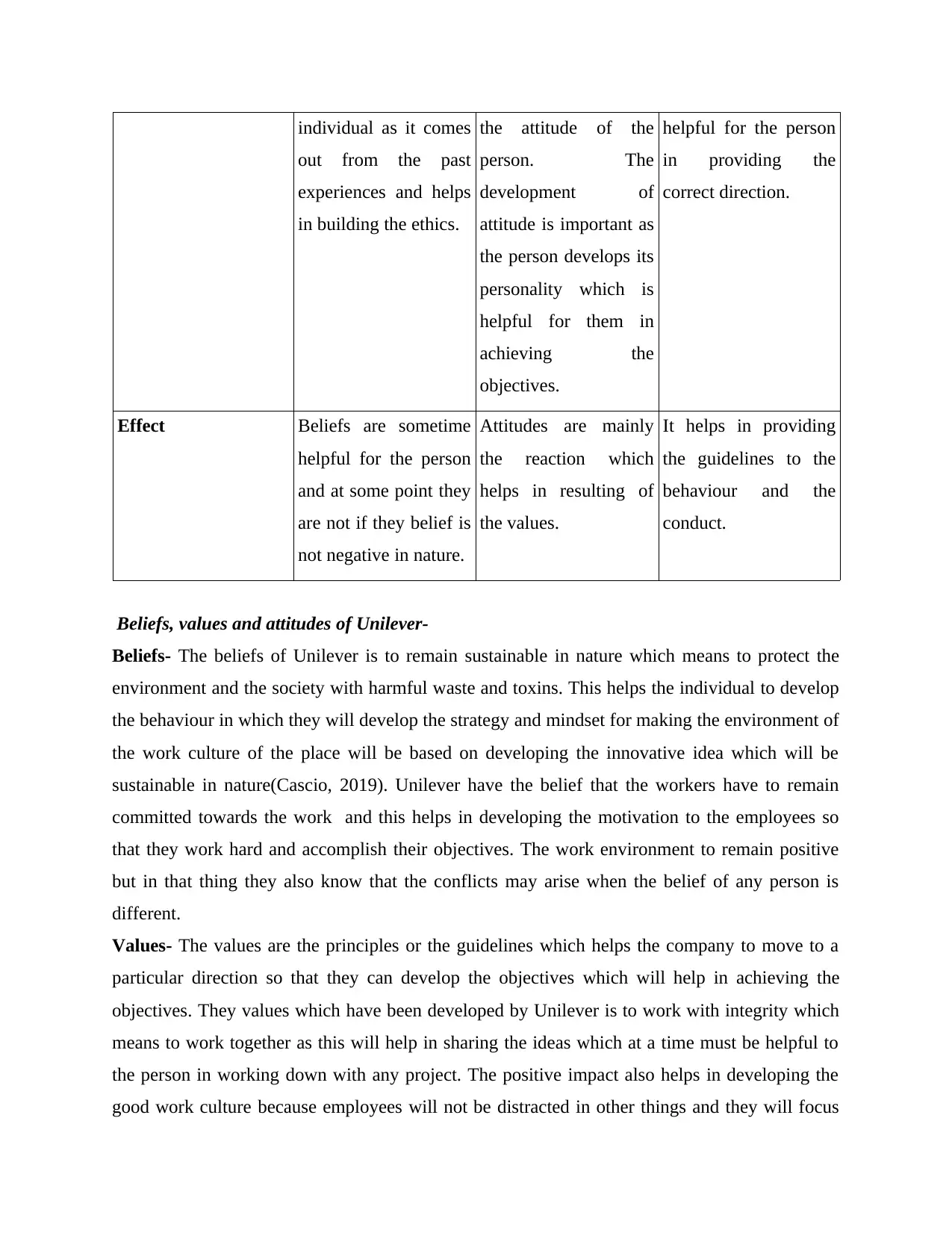
individual as it comes
out from the past
experiences and helps
in building the ethics.
the attitude of the
person. The
development of
attitude is important as
the person develops its
personality which is
helpful for them in
achieving the
objectives.
helpful for the person
in providing the
correct direction.
Effect Beliefs are sometime
helpful for the person
and at some point they
are not if they belief is
not negative in nature.
Attitudes are mainly
the reaction which
helps in resulting of
the values.
It helps in providing
the guidelines to the
behaviour and the
conduct.
Beliefs, values and attitudes of Unilever-
Beliefs- The beliefs of Unilever is to remain sustainable in nature which means to protect the
environment and the society with harmful waste and toxins. This helps the individual to develop
the behaviour in which they will develop the strategy and mindset for making the environment of
the work culture of the place will be based on developing the innovative idea which will be
sustainable in nature(Cascio, 2019). Unilever have the belief that the workers have to remain
committed towards the work and this helps in developing the motivation to the employees so
that they work hard and accomplish their objectives. The work environment to remain positive
but in that thing they also know that the conflicts may arise when the belief of any person is
different.
Values- The values are the principles or the guidelines which helps the company to move to a
particular direction so that they can develop the objectives which will help in achieving the
objectives. They values which have been developed by Unilever is to work with integrity which
means to work together as this will help in sharing the ideas which at a time must be helpful to
the person in working down with any project. The positive impact also helps in developing the
good work culture because employees will not be distracted in other things and they will focus
out from the past
experiences and helps
in building the ethics.
the attitude of the
person. The
development of
attitude is important as
the person develops its
personality which is
helpful for them in
achieving the
objectives.
helpful for the person
in providing the
correct direction.
Effect Beliefs are sometime
helpful for the person
and at some point they
are not if they belief is
not negative in nature.
Attitudes are mainly
the reaction which
helps in resulting of
the values.
It helps in providing
the guidelines to the
behaviour and the
conduct.
Beliefs, values and attitudes of Unilever-
Beliefs- The beliefs of Unilever is to remain sustainable in nature which means to protect the
environment and the society with harmful waste and toxins. This helps the individual to develop
the behaviour in which they will develop the strategy and mindset for making the environment of
the work culture of the place will be based on developing the innovative idea which will be
sustainable in nature(Cascio, 2019). Unilever have the belief that the workers have to remain
committed towards the work and this helps in developing the motivation to the employees so
that they work hard and accomplish their objectives. The work environment to remain positive
but in that thing they also know that the conflicts may arise when the belief of any person is
different.
Values- The values are the principles or the guidelines which helps the company to move to a
particular direction so that they can develop the objectives which will help in achieving the
objectives. They values which have been developed by Unilever is to work with integrity which
means to work together as this will help in sharing the ideas which at a time must be helpful to
the person in working down with any project. The positive impact also helps in developing the
good work culture because employees will not be distracted in other things and they will focus
Paraphrase This Document
Need a fresh take? Get an instant paraphrase of this document with our AI Paraphraser
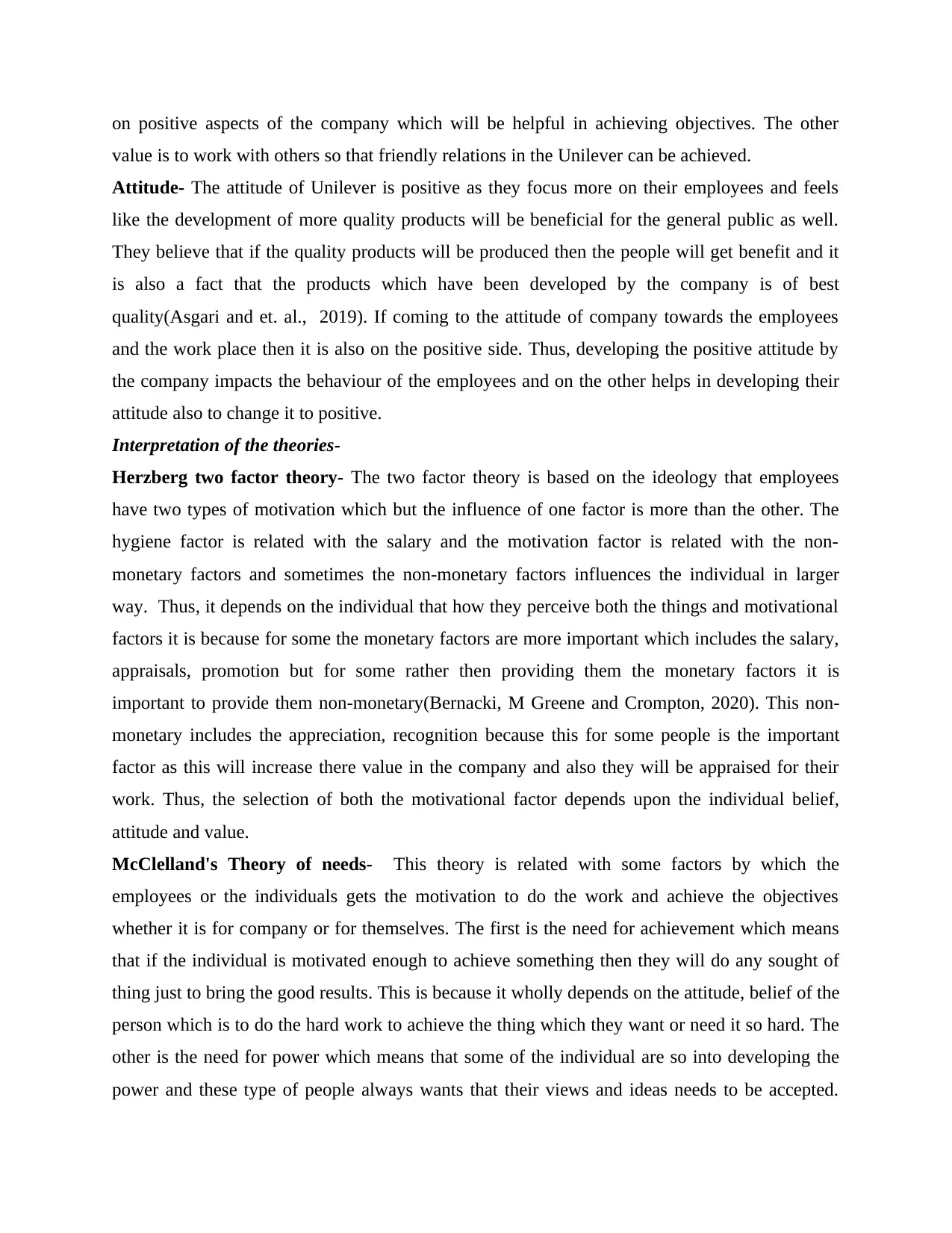
on positive aspects of the company which will be helpful in achieving objectives. The other
value is to work with others so that friendly relations in the Unilever can be achieved.
Attitude- The attitude of Unilever is positive as they focus more on their employees and feels
like the development of more quality products will be beneficial for the general public as well.
They believe that if the quality products will be produced then the people will get benefit and it
is also a fact that the products which have been developed by the company is of best
quality(Asgari and et. al., 2019). If coming to the attitude of company towards the employees
and the work place then it is also on the positive side. Thus, developing the positive attitude by
the company impacts the behaviour of the employees and on the other helps in developing their
attitude also to change it to positive.
Interpretation of the theories-
Herzberg two factor theory- The two factor theory is based on the ideology that employees
have two types of motivation which but the influence of one factor is more than the other. The
hygiene factor is related with the salary and the motivation factor is related with the non-
monetary factors and sometimes the non-monetary factors influences the individual in larger
way. Thus, it depends on the individual that how they perceive both the things and motivational
factors it is because for some the monetary factors are more important which includes the salary,
appraisals, promotion but for some rather then providing them the monetary factors it is
important to provide them non-monetary(Bernacki, M Greene and Crompton, 2020). This non-
monetary includes the appreciation, recognition because this for some people is the important
factor as this will increase there value in the company and also they will be appraised for their
work. Thus, the selection of both the motivational factor depends upon the individual belief,
attitude and value.
McClelland's Theory of needs- This theory is related with some factors by which the
employees or the individuals gets the motivation to do the work and achieve the objectives
whether it is for company or for themselves. The first is the need for achievement which means
that if the individual is motivated enough to achieve something then they will do any sought of
thing just to bring the good results. This is because it wholly depends on the attitude, belief of the
person which is to do the hard work to achieve the thing which they want or need it so hard. The
other is the need for power which means that some of the individual are so into developing the
power and these type of people always wants that their views and ideas needs to be accepted.
value is to work with others so that friendly relations in the Unilever can be achieved.
Attitude- The attitude of Unilever is positive as they focus more on their employees and feels
like the development of more quality products will be beneficial for the general public as well.
They believe that if the quality products will be produced then the people will get benefit and it
is also a fact that the products which have been developed by the company is of best
quality(Asgari and et. al., 2019). If coming to the attitude of company towards the employees
and the work place then it is also on the positive side. Thus, developing the positive attitude by
the company impacts the behaviour of the employees and on the other helps in developing their
attitude also to change it to positive.
Interpretation of the theories-
Herzberg two factor theory- The two factor theory is based on the ideology that employees
have two types of motivation which but the influence of one factor is more than the other. The
hygiene factor is related with the salary and the motivation factor is related with the non-
monetary factors and sometimes the non-monetary factors influences the individual in larger
way. Thus, it depends on the individual that how they perceive both the things and motivational
factors it is because for some the monetary factors are more important which includes the salary,
appraisals, promotion but for some rather then providing them the monetary factors it is
important to provide them non-monetary(Bernacki, M Greene and Crompton, 2020). This non-
monetary includes the appreciation, recognition because this for some people is the important
factor as this will increase there value in the company and also they will be appraised for their
work. Thus, the selection of both the motivational factor depends upon the individual belief,
attitude and value.
McClelland's Theory of needs- This theory is related with some factors by which the
employees or the individuals gets the motivation to do the work and achieve the objectives
whether it is for company or for themselves. The first is the need for achievement which means
that if the individual is motivated enough to achieve something then they will do any sought of
thing just to bring the good results. This is because it wholly depends on the attitude, belief of the
person which is to do the hard work to achieve the thing which they want or need it so hard. The
other is the need for power which means that some of the individual are so into developing the
power and these type of people always wants that their views and ideas needs to be accepted.
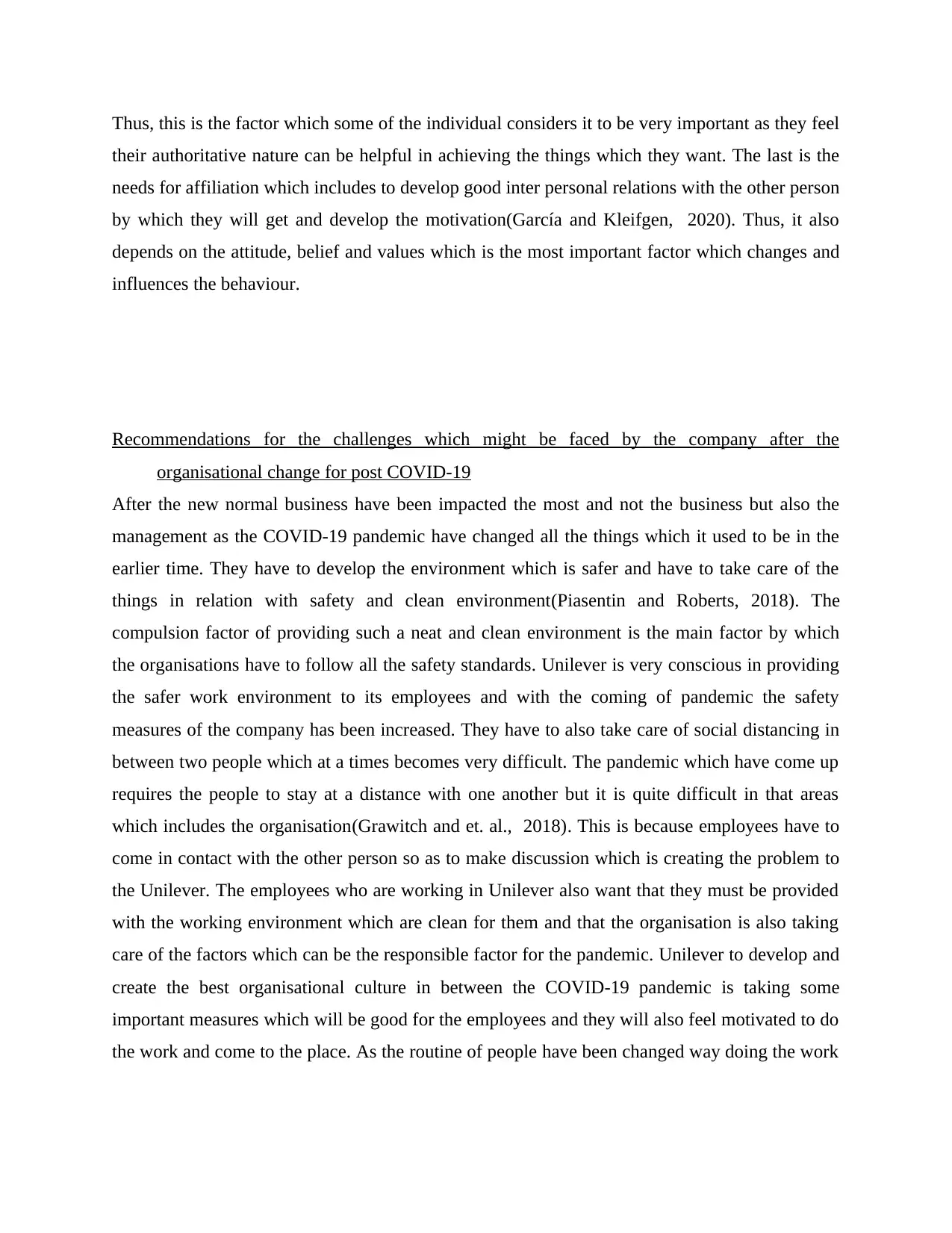
Thus, this is the factor which some of the individual considers it to be very important as they feel
their authoritative nature can be helpful in achieving the things which they want. The last is the
needs for affiliation which includes to develop good inter personal relations with the other person
by which they will get and develop the motivation(García and Kleifgen, 2020). Thus, it also
depends on the attitude, belief and values which is the most important factor which changes and
influences the behaviour.
Recommendations for the challenges which might be faced by the company after the
organisational change for post COVID-19
After the new normal business have been impacted the most and not the business but also the
management as the COVID-19 pandemic have changed all the things which it used to be in the
earlier time. They have to develop the environment which is safer and have to take care of the
things in relation with safety and clean environment(Piasentin and Roberts, 2018). The
compulsion factor of providing such a neat and clean environment is the main factor by which
the organisations have to follow all the safety standards. Unilever is very conscious in providing
the safer work environment to its employees and with the coming of pandemic the safety
measures of the company has been increased. They have to also take care of social distancing in
between two people which at a times becomes very difficult. The pandemic which have come up
requires the people to stay at a distance with one another but it is quite difficult in that areas
which includes the organisation(Grawitch and et. al., 2018). This is because employees have to
come in contact with the other person so as to make discussion which is creating the problem to
the Unilever. The employees who are working in Unilever also want that they must be provided
with the working environment which are clean for them and that the organisation is also taking
care of the factors which can be the responsible factor for the pandemic. Unilever to develop and
create the best organisational culture in between the COVID-19 pandemic is taking some
important measures which will be good for the employees and they will also feel motivated to do
the work and come to the place. As the routine of people have been changed way doing the work
their authoritative nature can be helpful in achieving the things which they want. The last is the
needs for affiliation which includes to develop good inter personal relations with the other person
by which they will get and develop the motivation(García and Kleifgen, 2020). Thus, it also
depends on the attitude, belief and values which is the most important factor which changes and
influences the behaviour.
Recommendations for the challenges which might be faced by the company after the
organisational change for post COVID-19
After the new normal business have been impacted the most and not the business but also the
management as the COVID-19 pandemic have changed all the things which it used to be in the
earlier time. They have to develop the environment which is safer and have to take care of the
things in relation with safety and clean environment(Piasentin and Roberts, 2018). The
compulsion factor of providing such a neat and clean environment is the main factor by which
the organisations have to follow all the safety standards. Unilever is very conscious in providing
the safer work environment to its employees and with the coming of pandemic the safety
measures of the company has been increased. They have to also take care of social distancing in
between two people which at a times becomes very difficult. The pandemic which have come up
requires the people to stay at a distance with one another but it is quite difficult in that areas
which includes the organisation(Grawitch and et. al., 2018). This is because employees have to
come in contact with the other person so as to make discussion which is creating the problem to
the Unilever. The employees who are working in Unilever also want that they must be provided
with the working environment which are clean for them and that the organisation is also taking
care of the factors which can be the responsible factor for the pandemic. Unilever to develop and
create the best organisational culture in between the COVID-19 pandemic is taking some
important measures which will be good for the employees and they will also feel motivated to do
the work and come to the place. As the routine of people have been changed way doing the work
⊘ This is a preview!⊘
Do you want full access?
Subscribe today to unlock all pages.

Trusted by 1+ million students worldwide
1 out of 16
Related Documents
Your All-in-One AI-Powered Toolkit for Academic Success.
+13062052269
info@desklib.com
Available 24*7 on WhatsApp / Email
![[object Object]](/_next/static/media/star-bottom.7253800d.svg)
Unlock your academic potential
Copyright © 2020–2026 A2Z Services. All Rights Reserved. Developed and managed by ZUCOL.




